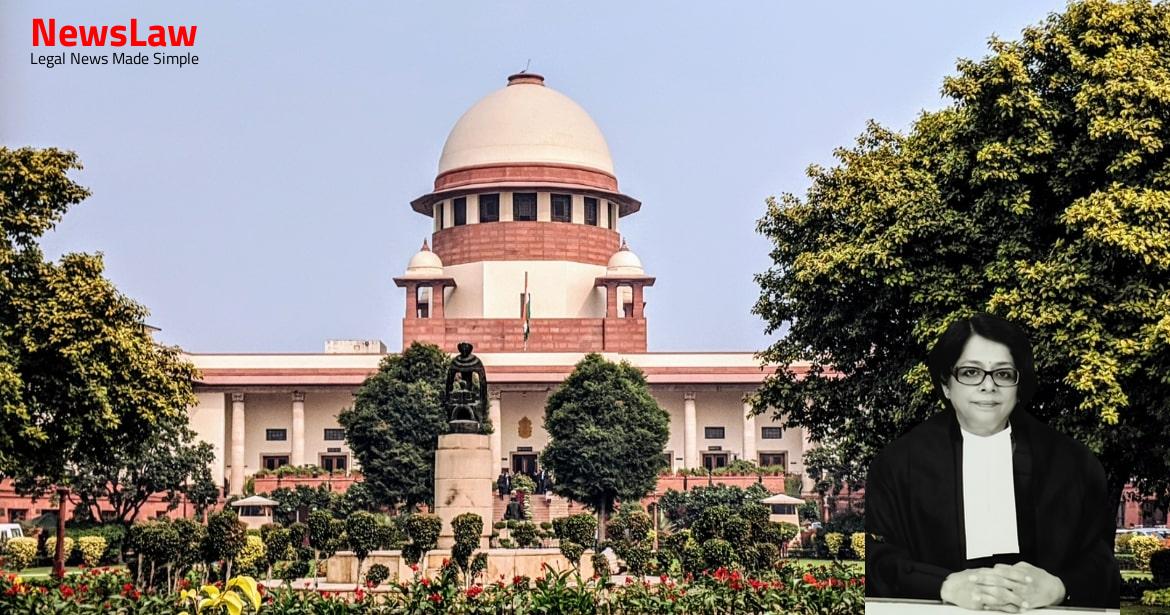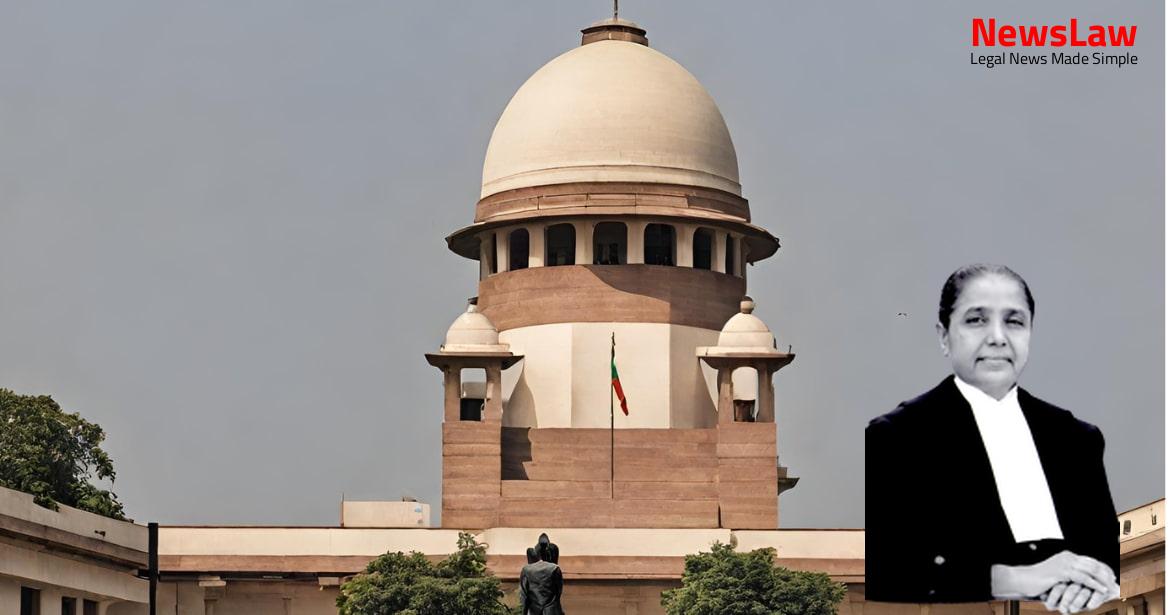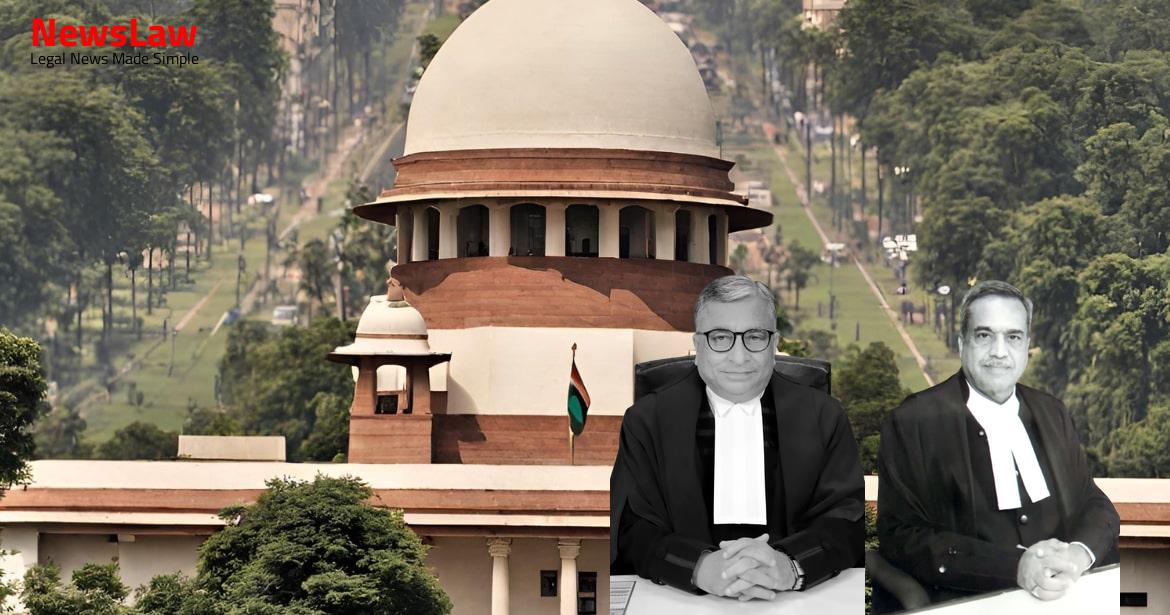In a landmark decision, the Supreme Court of India has addressed the Land Auction Irregularities Case involving Prestige H.M. Polycontainers Ltd. The judgement sheds light on critical issues regarding auction processes and adherence to statutory provisions. This case has far-reaching implications for fairness and transparency in land auctions, emphasizing the importance of upholding constitutional principles. Let’s delve into the details of this significant legal ruling.
Facts
- The appellant deposited the entire auction amount on 04.12.2008.
- The Sale Certificate of the Immovable Property was issued to the appellant on 03.12.2008.
- The auction sale was approved on 16.01.2009, declaring the appellant as the successful auction purchaser.
- The appellant’s objections were raised on 10.12.2008, which were recorded in a letter on 19.12.2008.
- The Additional Collector on 01.12.2008 accorded sanction for the auction.
- The Additional Commissioner set aside the orders and remanded the matter to the Additional Collector.
- The High Court rejected the writ petitions filed by the appellant.
- The appellant appealed the decision through two appeals in the High Court.
- The interim protection granted by the court was continued for 12 weeks from the decision date.
- The Apex Court emphasized that strict adherence to Rules in public auctions under the SARFAESI Act is crucial.
- The High Court set aside the executing court’s order, stating that the judgment debtor could avoid sale by depositing Rs. 7,15,000.
- The auction purchaser appealed, leading to both appeals being allowed by respondent no. 8 in a common order.
- Respondent no. 8 found the sale order and process followed to be illegal, remanding the proceedings for fresh adjudication.
- The appellant then filed multiple writ petitions before the High Court in response to the remand order.
- High Court, in WP No 1564 of 2010, stayed the operation of the order and directed parties to maintain the status quo.
Also Read: Arbitration Dispute Resolution: Key Ruling by the Supreme Court of India
Issue
- The court needs to consider whether the provisions of Order XXI Rule 90 of the Code of Civil Procedure would be applicable to writ proceedings under Article 226 of the Constitution.
Also Read: School Management Dispute: High Court Ruling on Service Conditions
Arguments
- Senior Counsel argued that the appeals filed by the Petitioner were not maintainable under Section 247 of the Revenue Code.
- Pointed out that the notice of the intended sale of the property was displayed as per Section 193 of the Revenue Code.
- Emphasized that establishing material irregularity or fraud is not sufficient to set aside the sale.
- Referred to the Chilamkurti Bala Subrahmanyam v. Samanthapudi Vijaya Lakshmi case to support the argument.
- Stressed that the Additional Commissioner had no jurisdiction to entertain the appeals.
- Highlighted that the Petitioner is a bona fide purchaser of the property through a duly conducted auction.
- Argued that the aggrieved party must prove substantial injury due to irregularity or fraud to set aside the sale.
- Mentioned that the auctioned property was used for setting up an oxygen cylinder manufacturing unit employing over 200 workers.
- Submitted that the property was purchased in 2008 as per government-approved valuation reports.
- Senior Counsel vehemently contested the High Court’s decision regarding the auction proceedings.
- The transaction leading to the appellant taking over the suit property was deemed as fraudulent and collusive.
- Critical facts were allegedly suppressed by the Tahsildar during the auction process from the Additional Collector.
- Valuation of properties was done in a self-serving manner to benefit the appellant.
- The appellant’s offer to pay the market value of the property was not entertained by the bankers.
- The High Court decision relied on the Mathew Varghese v. M. Amritha Kumar case, highlighting the breach of mandatory 30 days’ sale notice.
- The sale was confirmed without realizing complete payments, indicating fraudulent proceedings.
- Prestige H.M. Polycontainers Ltd. denied signing the ‘No Objection’ letter, hinting at fraud.
- The Tahsildar initiated sale confirmation without following mandatory processes.
- Objections from IFCI regarding the mortgage of the land were allegedly not disclosed, vitiating the entire process.
Also Read: Judgment on Tender Cancellation: Upholding Fairness and Public Interest
Analysis
- The court deliberated on whether the provisions of Order XXI Rule 90 of the Code of Civil Procedure apply to writ proceedings under Article 226 of the Constitution.
- The analysis highlighted the distinction between illegality and irregularity in confirming the sale, emphasizing that setting aside a sale should not merely rely on material irregularity or fraud.
- The judgement discussed the role of the High Court in writ proceedings compared to civil courts, focusing on the application of procedural provisions.
- Various illegalities were pointed out in the confirmation of the sale, indicating a lack of adherence to statutory provisions.
- The importance of fairness and transparency in the auction process, in alignment with constitutional principles, was underscored.
- The discussion touched upon the nuances of auction sales, attachment requirements, and the need to establish substantial injury for setting aside a sale.
- Different views on setting aside sales based on attachment irregularities or substantial injury were examined to determine the correct legal stance.
- The balance between the expediency of writ petitions and adherence to procedural requirements from civil proceedings was highlighted.
- The judgement concluded by affirming the executing court’s decision and ruling out any interference with the High Court’s judgement based on the analysis presented.
- Section 141 of the Code of Civil Procedure excludes proceedings under Article 226 of the Constitution from its application.
- The provisions of the Code cannot be made applicable to a proceeding under Article 226 of the Constitution based solely on Writ Rule 32.
- Sections 194 and 195 of the Revenue Code govern the process of sale by auction by the Collector, specifying timelines and procedures.
- Section 247 of the Revenue Code deals with appeals and appellate authorities in the absence of express provisions.
- The Additional Commissioner’s jurisdiction in deciding appeals was questioned but the High Court upheld the order remanding the matter.
- Various sections of the Revenue Code outline procedures related to sale of property, notices, applications, and appeals.
- Rule 90 of the CPC allows for setting aside a sale on grounds of irregularity or fraud, with conditions to prove substantial injury.
- Amendments to Rule 90 were made based on the Law Commission’s recommendations for clarity and fairness in sale set-aside cases.
- The Additional Commissioner, Konkan Division, Maharashtra did not have jurisdiction to decide the appeals filed by the parties under Section 247 of the Revenue Code as there was a remedy available under Section 210 of the same code.
- Section 210 allows for an application to set aside a sale of immovable property within 30 days of the sale date by depositing specified amounts with the Collector.
- Judicial review of administrative action aims to prevent arbitrariness, irrationality, unreasonableness, bias, and mala fides.
- The principle of judicial review applies to review the decision-making process itself, not the merits of the decision.
- The concept of accountability must be maintained to prevent arbitrary actions by public authorities.
- The court should confine itself to the legality of actions, checking for excess of powers, errors of law, breaches of natural justice, or unreasonable decisions.
- Codes of Civil Procedure apply to writ proceedings only insofar as they can be made applicable.
- The High Court exercises wide jurisdiction under Article 226 for substantial justice between parties, focusing on fairness and non-arbitrariness.
- Judicial review in matters of tenders and contracts should ensure the State acts validly and not whimsically.
- Allegations of illegalities, irrationality, and procedural impropriety provide grounds for judicial review without interfering in legitimate public actions.
- Avenues for seeking damages exist in civil courts for tenderers or contractors with grievances, reducing the need for judicial interference.
- Explanation to Section 141 of the CPC clarifies that its provisions do not apply to proceedings under Article 226 of the Constitution.
- Public functionaries should be duty-conscious rather than power-charged, following reasonable and expeditious procedures.
- Courts will not interfere in bona fide decisions relating to contract awards that are in the public interest, maintaining the strict test of reasonableness.
- If possession of the suit property is taken over, the plant will have to be dismantled unless someone is interested in taking over the entire plant with the land.
- The appellant is given one opportunity to save its industrial unit set up on the subject land.
- Approximately 200 employees are working in the plant.
Decision
- The appellant is directed to deposit Rs. 4,00,00,000/- with ARCIL within six months from today.
- Failure to deposit the amount will result in authorities taking possession of the unit and land for a fresh auction.
- The period for depositing the amount starts from the date the decision or order is received by the appellant.
- If the amount is deposited in time, contempt proceedings in the High Court of Bombay will be terminated.
- Both appeals are allowed in part, and pending applications will be disposed of.
Case Title: M/S. AL-CAN EXPORT PVT. LTD. Vs. PRESTIGE H.M. POLYCONTAINERS LTD. AND ORS. (2024 INSC 500)
Case Number: C.A. No.-007254-007254 – 2024



